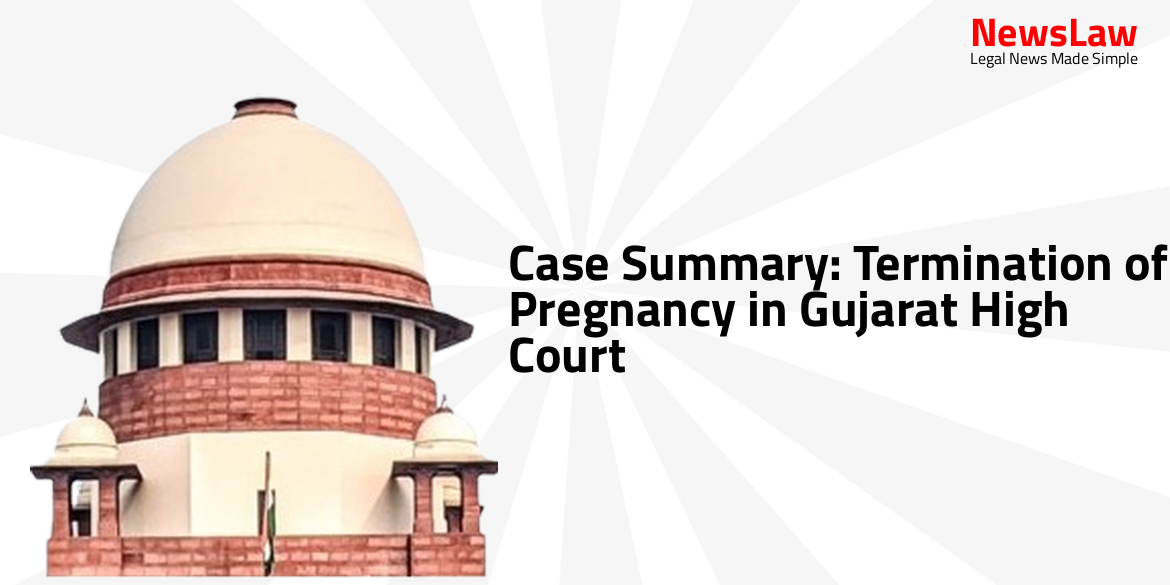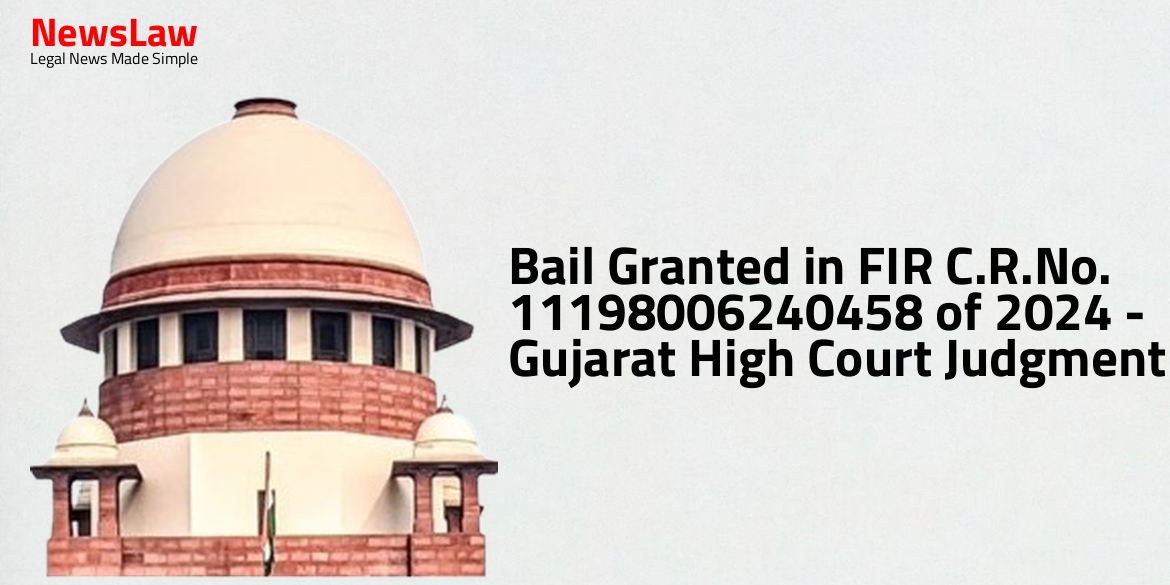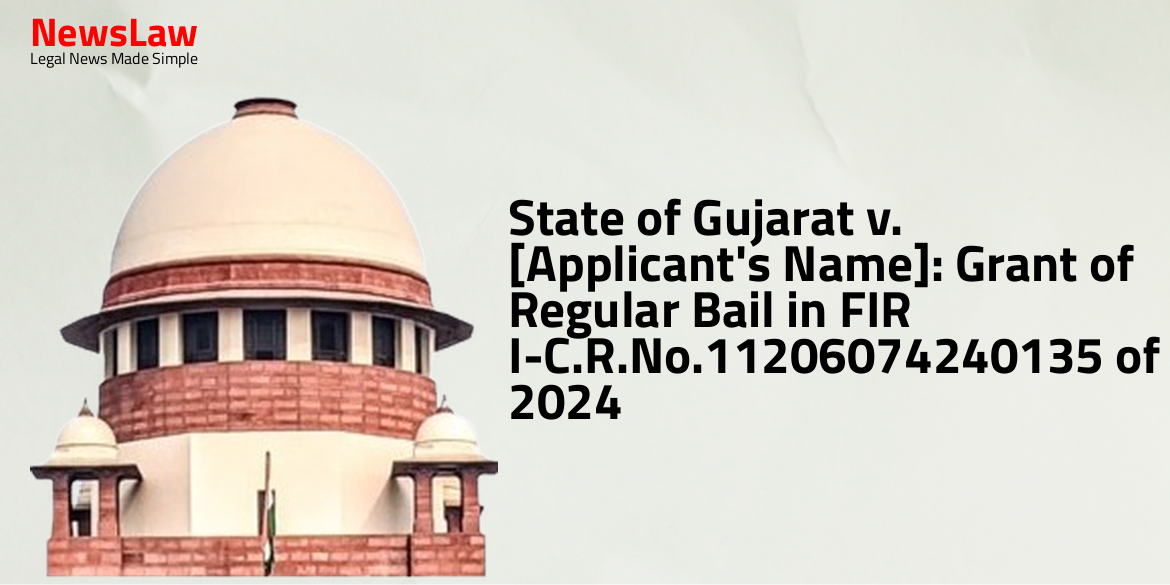In a significant ruling by the Gujarat High Court, a case regarding the termination of pregnancy was discussed, emphasizing the rights of the woman involved. The judgment focused on protecting the mental and physical well-being of the petitioner, a 19-year-old rape survivor. The Court’s decision highlighted the importance of ensuring reproductive autonomy and safeguarding the health of women in such challenging circumstances.
Facts
- The victim, aged 19 years six months, sought permission to terminate her pregnancy before completion of 24 weeks due to the immense injury to her mental health caused by the unwanted pregnancy.
- The victim had developed a relationship with Mitesh Himmatbhai Thakor, which ended after instances of withdrawal from the relationship by Mitesh.
- The petitioner’s mother was aware of the relationship, and the families had initially agreed to an engagement.
- The victim lodged an FIR against Mitesh Himmatbhai Thakor for rape offenses on 03.05.2024.
- Medical examination revealed the victim’s pregnancy of 16 weeks 2 days with no gross congenital fetal anomaly.
- The victim’s financial instability and poor family conditions led her to seek employment in a call center to support the family.
- The victim’s mother also appeared before the court, supporting the termination of pregnancy due to the prevailing circumstances.
- A medical committee reviewed the case and confirmed the victim’s fitness for pregnancy termination under the Medical Termination of Pregnancy (Amendment) Act, 2021.
- The committee emphasized the need for informed consent for the termination procedure and testing of abortus for paternity.
- The victim appeared before the court with her mother, and necessary medical reports confirmed her three months pregnancy.
Arguments
- The respondent, being the State, has opposed the petition seeking permission to terminate the pregnancy conceived as a result of rape.
- The State argues that termination of pregnancy should not be allowed as it is a violation of the right to life of the unborn child.
- It is contended by the State that the protection of the unborn child’s right to life should be upheld despite the circumstances of conception.
- The State further submits that allowing termination of pregnancy in cases of rape may set a dangerous precedent and undermine the sanctity of life.
- Learned advocate Mr. P.V. Patadiya appeared through legal aid service authority on behalf of the petitioner.
- The petitioner was carrying a 16-week pregnancy at the time of filing the petition on 14.5.2024.
- It was argued that continuing the pregnancy would be unsafe and dangerous.
- The petitioner, aged 19 years and six months, would face grave adverse effects on both her mental and physical health if the pregnancy continued.
- The Court was urged to permit the termination of the pregnancy.
Analysis
- The Supreme Court emphasized the physical and mental health impacts on pregnant women in cases of unwanted pregnancies.
- The decision to allow termination of pregnancy in cases of rape survivors was based on protecting the woman’s health.
- The Court applied a purposive interpretation of the Medical Termination of Pregnancy Act and its Rules, 2003.
- The petitioner, a 19-year-old rape victim, sought relief under Article 226 of the Constitution to engage the High Court’s discretionary jurisdiction.
- The Supreme Court highlighted the importance of exercising judicial discretion judiciously based on relevant facts.
- Considering the legal provisions and the woman’s rights, the petition for termination of pregnancy was deemed worthy of consideration.
- Article 21 protects a woman’s right to choose termination of pregnancy if her health is at risk.
- The ultimate decision-making authority regarding abortion lies with the woman herself.
- International laws and Constitutional provisions emphasize women’s rights in reproductive matters.
- Forcing a woman to continue a pregnancy resulting from rape goes against constitutional principles, and termination is allowed under certain conditions.
- The MTP Act recognizes a woman’s reproductive autonomy, regardless of her marital status.
- Relevant court cases and amendments were cited to support the inclusion of unmarried and single women under the Act’s provisions.
- Section 3 of the Act allows termination of pregnancy under specified conditions by registered medical practitioners.
- Pregnancy termination requires consent of the pregnant woman or her guardian if she is under 18 or mentally ill.
- Pregnancy can be terminated up to twenty weeks based on Section 3(2)(a) of the Act.
- For pregnancies between twenty and twenty-four weeks, termination is allowed for specific categories of women as per Section 3(2)(b) and Rule 3B of the Amendment Rules.
- The petitioner has freely consented to the termination of her pregnancy without fear or pressure.
- Medical opinion does not raise any concerns about the termination of her pregnancy.
- The circumstances within the family of the petitioner make it difficult for her to raise and nurture a child.
- The decision to terminate the pregnancy is also supported by the petitioner’s mother.
- Giving birth to the child may pose risks to the physical health of the petitioner.
- Raising a child conceived from rape could result in severe mental health implications for the petitioner.
- The pregnancy is below 24 weeks, specifically 16 weeks and 2 days as of the opinion dated 14.5.2024.
- The Committee’s opinion supports the termination of the petitioner’s pregnancy.
- Considering the petitioner’s tender age, the trauma, mental agony, and the potential social ostracism due to her unmarried status, termination of the pregnancy is deemed appropriate by the Court.
Decision
- The petitioner is permitted to terminate her pregnancy.
- The termination of pregnancy is to be carried out at GMERS Hospital, Sola, Ahmedabad, on 20.05.2024 or at a time deemed fit by the petitioner.
- The petitioner must file an undertaking expressing her free consent for the termination before the Hospital.
- The termination must be conducted in the presence of a qualified physician with necessary precautions to safeguard the victim’s physical and mental health.
- The respondent is directed to conduct the medical termination by constituting a team for the procedure.
- Tissue from the fetus must be extracted for DNA identification in a scientific manner and handed over to the Police Inspector for forwarding to FSL at Gandhinagar.
Case Title: ABC Vs. STATE OF GUJARAT
Case Number: R/SCR.A/5898/2024



